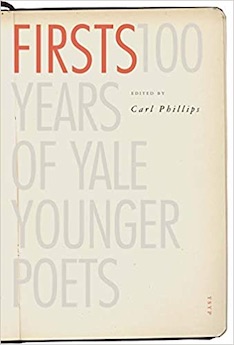By Indira Ganesan
Firsts is a curiously democratic gathering of poems by poets who have won the Yale Younger Poets Prize. The title could stand for the first time these poets were brought into prominence by winning a prize, or that they rank first in the company of poets. Each poet gets three poems, much like the guidelines of a proper contest. At first, the anthology seems to be about the judges. Indeed, the editor has written an introduction that is mostly about the judges of the prize, and if you turn to the end, you will find a list of judges, listed by year, followed by a list of the winning poets. Turning to the poems, you might be mildly irritated that each poet is presented to the reader with a mini cv, stating place of birth, books, and prizes, as well as occupation. Could there be a stuffier volume of poems? What was Carl Phillips thinking, augmenting tweediness with tweed, the fustiness of academia?
Obviously, Phillips knew what he was doing. The judges are after all those who curated what was fit to be a “first,” and guided the way poetry was presented to the public. Diversity as he points out in the excellent introduction, did not arrive with regularity until after 1998, helped by the founding of Cave Canem, which fostered the growth of African American poetry in 1996. Before 1998, only two writers of color, Margaret Walker and Cathy Song, were awarded the prize. He also discusses how World War I had an effect in the psychological makeup of the poets in the series before 1932, with “these poets writing the only poems they could, in the best ways they knew.” Thus, a certain sentimentality enters the verse, before Modernism takes the helm.
As for the selection, after you let out the steam of having read resume after resume of each poet, steam which might arrive at least in part from your own ego, you discover a pretty neat set of poems. Here is Cathy Song describing music as squares of birthday chocolate. Here is Leslie Ullman telling us that “The entire population/has forgotten how the bodies of its women / emerge at night before sleep.” Here is Davis McCombs describing “cave wind” turning to fog, all metaphor and beauty and thinking. Here are James Wright, Alan Dugan, Carolyn Forche, Olga Broumas, and a host of others—most of whose names, I confess, are unknown to me.
One need not read the volume in sequence. Treat it like the I-Ching, and encounter poems randomly. Read each aloud and read again. Let these poems enter your mind and heart, for poets are the wisest among us, who can render language into something comprehensible about the world around us and within us.
Novelist Indira Ganesan was inducted into Phi Beta Kappa at Vassar College in 1982. Her books include The Journey (Alfred A. Knopf, 1990), Inheritance (Alfred A. Knopf, 1998) and As Sweet As Honey (Alfred A. Knopf, 2013).




